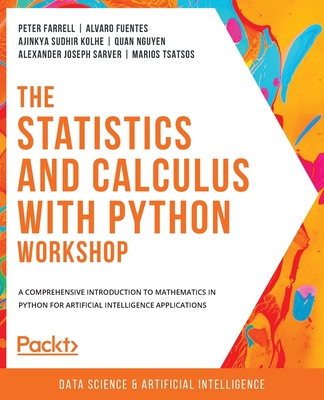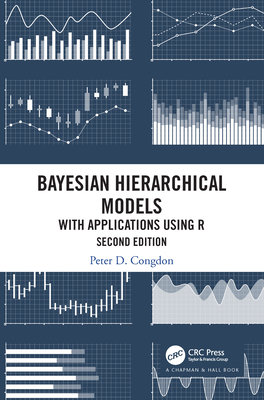Bayesian Analysis with Python - Third Edition: A practical guide to probabilistic modeling
暫譯: 使用 Python 進行貝葉斯分析(第三版):實用的機率模型指南
Martin, Osvaldo
- 出版商: Packt Publishing
- 出版日期: 2024-01-31
- 售價: $1,980
- 貴賓價: 9.5 折 $1,881
- 語言: 英文
- 頁數: 394
- 裝訂: Quality Paper - also called trade paper
- ISBN: 1805127160
- ISBN-13: 9781805127161
-
相關分類:
Python、程式語言、機率統計學 Probability-and-statistics
立即出貨 (庫存 < 3)
買這商品的人也買了...
-
 如何衡量萬事萬物:大數據時代,做好量化決策、分析的有效方法 (How to Measure Anything: Finding the Value of
如何衡量萬事萬物:大數據時代,做好量化決策、分析的有效方法 (How to Measure Anything: Finding the Value of$480$379 -
 了不起的 Markdown
了不起的 Markdown$390$371 -
 大數據資料可視化:Python QT GUI 程式設計
大數據資料可視化:Python QT GUI 程式設計$880$695 -
 The Statistics and Calculus with Python Workshop: A comprehensive introduction to mathematics in Python for artificial intelligence applications
The Statistics and Calculus with Python Workshop: A comprehensive introduction to mathematics in Python for artificial intelligence applications$1,480$1,406 -
 Feature Engineering and Selection: A Practical Approach for Predictive Models
Feature Engineering and Selection: A Practical Approach for Predictive Models$2,250$2,138 -
 知識圖譜實戰
知識圖譜實戰$594$564 -
 $305知識圖譜:方法、工具與案例
$305知識圖譜:方法、工具與案例
相關主題
商品描述
Learn the fundamentals of Bayesian modeling using state-of-the-art Python libraries, such as PyMC, ArviZ, Bambi, and more, guided by an experienced Bayesian modeler who contributes to these libraries
Key Features:
- Conduct Bayesian data analysis with step-by-step guidance
- Gain insight into a modern, practical, and computational approach to Bayesian statistical modeling
- Enhance your learning with best practices through sample problems and practice exercises
- Purchase of the print or Kindle book includes a free PDF eBook.
Book Description:
The third edition of Bayesian Analysis with Python serves as an introduction to the main concepts of applied Bayesian modeling using PyMC, a state-of-the-art probabilistic programming library, and other libraries that support and facilitate modeling like ArviZ, for exploratory analysis of Bayesian models; Bambi, for flexible and easy hierarchical linear modeling; PreliZ, for prior elicitation; PyMC-BART, for flexible non-parametric regression; and Kulprit, for variable selection.
In this updated edition, a brief and conceptual introduction to probability theory enhances your learning journey by introducing new topics like Bayesian additive regression trees (BART), featuring updated examples. Refined explanations, informed by feedback and experience from previous editions, underscore the book's emphasis on Bayesian statistics. You will explore various models, including hierarchical models, generalized linear models for regression and classification, mixture models, Gaussian processes, and BART, using synthetic and real datasets.
By the end of this book, you will possess a functional understanding of probabilistic modeling, enabling you to design and implement Bayesian models for your data science challenges. You'll be well-prepared to delve into more advanced material or specialized statistical modeling if the need arises.
What You Will Learn:
- Build probabilistic models using PyMC and Bambi
- Analyze and interpret probabilistic models with ArviZ
- Acquire the skills to sanity-check models and modify them if necessary
- Build better models with prior and posterior predictive checks
- Learn the advantages and caveats of hierarchical models
- Compare models and choose between alternative ones
- Interpret results and apply your knowledge to real-world problems
- Explore common models from a unified probabilistic perspective
- Apply the Bayesian framework's flexibility for probabilistic thinking
Who this book is for:
If you are a student, data scientist, researcher, or developer looking to get started with Bayesian data analysis and probabilistic programming, this book is for you. The book is introductory, so no previous statistical knowledge is required, although some experience in using Python and scientific libraries like NumPy is expected.
商品描述(中文翻譯)
學習使用最先進的 Python 函式庫(如 PyMC、ArviZ、Bambi 等)進行貝葉斯建模的基本原理,並由一位貢獻於這些函式庫的經驗豐富的貝葉斯建模專家指導
主要特色:
- 在逐步指導下進行貝葉斯數據分析
- 深入了解現代、實用且計算的貝葉斯統計建模方法
- 透過範例問題和練習題增強學習效果
- 購買印刷版或 Kindle 書籍可獲得免費 PDF 電子書。
書籍描述:
《使用 Python 進行貝葉斯分析》第三版作為應用貝葉斯建模主要概念的入門書,使用 PyMC 這個最先進的概率編程函式庫,以及其他支持和促進建模的函式庫,如 ArviZ 用於貝葉斯模型的探索性分析;Bambi 用於靈活且簡單的層級線性建模;PreliZ 用於先驗引導;PyMC-BART 用於靈活的非參數回歸;以及 Kulprit 用於變數選擇。
在這個更新版中,對概率論的簡要概念介紹增強了您的學習旅程,並引入了新的主題,如貝葉斯加法回歸樹(BART),並提供了更新的範例。經過前幾版的反饋和經驗,精煉的解釋強調了本書對貝葉斯統計的重視。您將探索各種模型,包括層級模型、用於回歸和分類的廣義線性模型、混合模型、高斯過程和 BART,使用合成和真實數據集。
在本書結束時,您將具備概率建模的功能性理解,使您能夠設計和實施貝葉斯模型以應對數據科學挑戰。如果有需要,您將為深入更高級的材料或專門的統計建模做好充分準備。
您將學到的內容:
- 使用 PyMC 和 Bambi 建立概率模型
- 使用 ArviZ 分析和解釋概率模型
- 獲得檢查模型合理性和必要時修改模型的技能
- 透過先驗和後驗預測檢查來建立更好的模型
- 了解層級模型的優勢和注意事項
- 比較模型並在替代模型之間做出選擇
- 解釋結果並將您的知識應用於現實問題
- 從統一的概率視角探索常見模型
- 應用貝葉斯框架的靈活性進行概率思考
本書適合誰:
如果您是學生、數據科學家、研究人員或開發者,想要開始進行貝葉斯數據分析和概率編程,本書適合您。這本書是入門級的,因此不需要先前的統計知識,但預期您對使用 Python 和科學函式庫(如 NumPy)有一些經驗。













